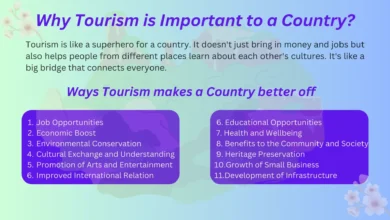
How does Research Contribute to the Field of Hospitality?
Today, Tourism and Hospitality Studies are very popular subjects in both undergraduate and graduate courses at many universities around the world. However, while they might seem like part of the same field of study, there are some differences between them. Hospitality students focus on providing service to customers, while tourism students focus on the experiences the places have to offer. Research plays an important role in both fields of study and can help you learn about new trends in hospitality or tourism as well as how these trends affect visitors and businesses within these industries…
Research helps shape better business practices:
There is always more than one way to complete a task, but it’s hard for business owners to know what works best. Research conducted by academics and professionals within hospitality allows them to see how things are done differently around the world so they can make well-informed decisions. Such decisions help them run better businesses.
As an academic, you also need research results in order to further your own career as well as improve student learning outcomes. That’s why we encourage students to participate in conferences and publish their work. In addition, universities use research findings when making funding decisions about which programs should be cut or expanded. Therefore, researchers have a vested interest in ensuring that their work is published as widely as possible.
This helps ensure that all types of schools from large public institutions to small private colleges have access to quality information. The result is a greater body of knowledge available to everyone involved in education, including those who aren’t directly involved with higher education.
Although it seems like common sense that sharing your ideas and discoveries would lead to improvements in other people’s lives, some people still seem surprised at how much research benefits society. For example, think about healthcare. Doctors regularly conduct studies to find out which treatments are most effective for various illnesses.
Research provides guidelines on how to most effectively market a product:
Through surveys, interviews, and focus groups, research can help determine how to market a product best. And they may even be able to show you how your competitors are marketing themselves. If you need some outside guidance in marketing a certain product or service, it’s often worth looking into whether or not someone is conducting research about that very subject. You might be surprised at what kind of information is out there.
There are other ways research benefits hotels: Hotel management should also keep an eye on industry trends when conducting their own research. The hospitality industry has been rapidly changing over recent years, and hotels have had to evolve along with it. If you’re not keeping up with what’s going on in your industry, you could be leaving money (and business) on the table.
Conducting market research can help you better understand what your customers want and that can go a long way toward keeping them happy and booking more rooms. It’s worth noting that many hotel chains conduct market research themselves; they may even share some of their findings publicly through whitepapers or case studies. But if you run a smaller hotel or one outside of a big chain, don’t worry you can still conduct your own research!
Research can show what draws people in (and keeps them there):
Tourism is a tough industry, with businesses needing to cater to an ever-shifting audience. Firms that remain relevant thrive; those that don’t are less likely to survive in such a fast-moving market. But determining what draws people in is often easier said than done: Potential customers change as they mature, while firms have no way of predicting when one competitor’s product will become another’s next big thing.
Research can help fill these gaps by helping companies understand how their target audience perceives their offerings. This information can then be used to guide development, from product design to marketing campaigns. Research can also help identify customer needs and wants and where opportunities lie for new products or services.
For example, if a firm discovers its target audience is looking for fresh food options on holiday, it might decide to invest in developing a new restaurant chain or menu item range. However, just because something looks like a good idea doesn’t mean it will succeed which is why researchers need to conduct thorough tests before launching anything new.
Research indicates ways consumers want experiences customized:
Through a study conducted by JWT and Towers Watson, it was discovered that companies should be paying attention to what consumers want: customization. In fact, 88% of U.S. consumers said they’d rather have an experience tailored for them than one with no personalization and nearly half (48%) said they expect customized experiences from brands at least some of the time.
The study also found that 67% preferred having an online profile, over email lists or other types of marketing databases. Having such a profile would allow businesses to send customers information about upcoming events, specials and more. Also, 71% of respondents said they’d like businesses to use their information so they can receive promotions on products or services based on their needs. This could include making suggestions based on previous purchases; if someone buys running shoes regularly, he might get ads for new running gear when he visits another site.
Research indicates what consumers want, which helps develop better products:
Research allows companies to collect valuable feedback from consumers, which can be used to create new products and services that better meet customers’ needs. If a company finds that consumers are interested in a specific type of product or service, they can then invest time and resources into developing it. Conversely, if no one is interested in a specific idea, it can be scrapped before costly development takes place. This saves companies time and money.
Additionally, collecting data on consumer behavior gives researchers insight into what works best for businesses—and what doesn’t work at all. This information can be used to improve existing processes and systems, making them more efficient and cost-effective.
Finally, research helps inform policy decisions: Policymakers need access to data about consumer preferences and behaviors in order to make informed decisions about public policy. Without good information, legislators risk creating laws that don’t address real problems or that simply aren’t effective at solving problems. Research provides policymakers with crucial insights into what people want and how their wants might change over time. This helps legislators design policies that will effectively solve problems while remaining relevant as trends shift over time.
Research indicates things that might hinder an experience:
To create a sustainable, thriving business, any business needs to take into account things that might hinder an experience. For example, if a potential customer is concerned about safety when going on vacation, they’re likely not going to book that trip. Research helps inform those decisions by looking at past trends and pointing out pitfalls. Research indicates things that will improve an experience:
While negative information can be helpful, it’s just as important to look for ways to improve your service or product. By conducting research, you can determine what your customers want and need from you, which will help you make better decisions about what direction your company should go in. It also shows customers that you care enough about their experience with your brand or business to invest time in researching how it could be improved.
This improves their perception of your brand and makes them more likely to return in the future. It allows businesses to be more creative: When starting a new business, there are so many unknowns that it can sometimes feel like you’re walking blindfolded through a minefield.
Conclusion:
Based on the literature, interviews, and personal experience it has been concluded that research is a vital element for success in any business. Without proper data analysis, one cannot make informed decisions which are crucial for day-to-day operations. Moreover, academic knowledge gained through research work helps as a foundation for further studies by providing a bird’s eye view of various topics.
Studies also help in identifying new opportunities that were previously not identified or may have been ignored. It is always advisable to conduct market research before venturing into any new project/ideas so that you can get an idea about your target audience and their expectations from your product/service. Research is an ongoing process; conducting periodic surveys can provide valuable insights into customer preferences, thereby helping you develop better products/services.




